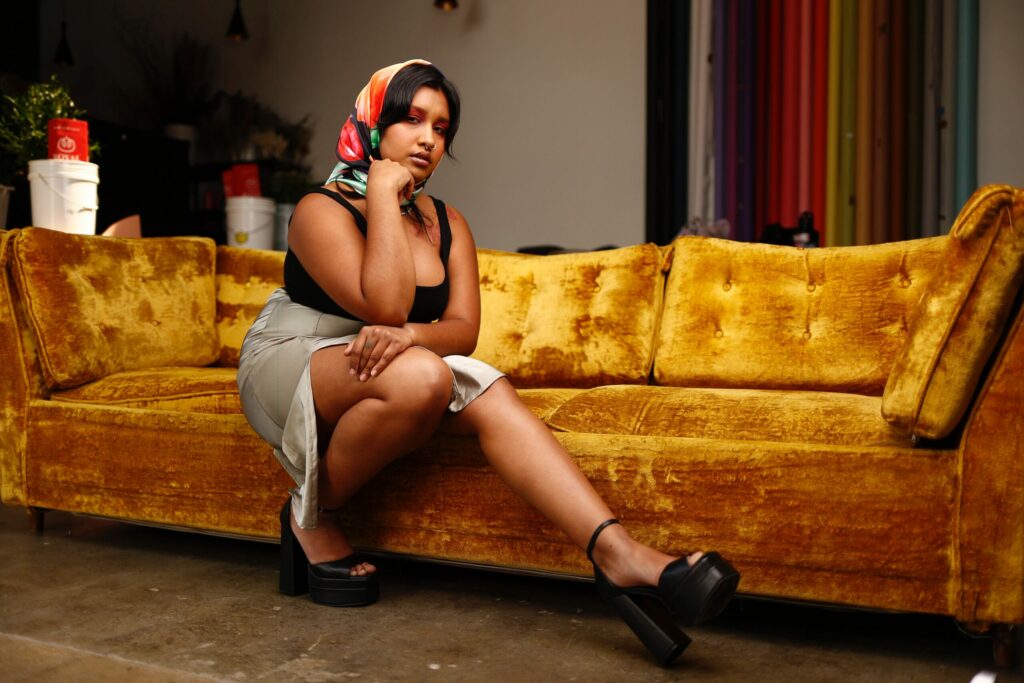Understanding the asexuality identity can feel like navigating uncharted territory.
The concept might seem alien to many, sparking curiosity and questions galore.
Acknowledge the asexuality identity as an indispensable part of human diversity that merits acknowledgment and comprehension. But how do we demystify this misunderstood sexual orientation?
In our journey towards inclusivity, acknowledging the asexuality identity becomes crucial. It’s about time we shed light on this often-overlooked aspect of the sexuality spectrum!
Aline Laurent-Mayard: The Trailblazing Podcaster
Meet Aline Laurent-Mayard, a dynamic force in the growing asexuality movement. She’s not just an accomplished journalist, author, and actor but also hosts one of the biggest platforms for advocating increased visibility for individuals identifying as asexual.
Let’s explore her inspiring journey and how she is using podcasting to create waves in society.
The Road to Understanding Asexuality
In her early years, Mayard found herself feeling different from others due to a lack of sexual attraction. This was something that initially left her perplexed until she discovered ‘asexuality’ – it all started making sense then.
This revelation led Maynard on an enlightening path where she began questioning traditional views about sex drive and intimate relationships. It dawned upon her that happiness doesn’t necessarily have to be tied to someone’s sexually attractive presence or engaging in sexual relations at all.
Echoing this sentiment was Yasmin Benoit, who realized her own identity within the modern asexuality crusade – further validating what Maynard had been experiencing. Their stories serve as powerful reminders that there are many ways people can feel differently about sexuality without being broken or wrong.
Taking Advocacy into Podcasting
To reach out to those grappling with similar struggles around understanding their sexuality, Maynard embarked on creating the Free From Desire podcast. This has now become synonymous with discussions around the role sexuality plays, especially when it comes down to navigating romantic relationships while belonging to the LGBTQIA community, particularly if they identify themselves as aromantic-asexual (aroace).
Beyond merely raising awareness, though, Free From Desire aims to challenge societal narratives equating happiness solely with sex, thereby helping its audience realize that other forms of emotional bonds are equally important in leading a fulfilling life. In the words of renowned writer Angela Chen: “Happiness doesn’t come from sex alone” – a philosophy echoed throughout the episodes hosted by the trailblazing podcaster herself.
Fighting Stereotypes & Building Acceptance
No discussion around growing acceptance of diverse identities would be complete without acknowledging ongoing efforts
Key Takeaway: Aline Laurent-Mayard is a beacon for the asexuality movement, challenging societal norms through her popular podcast, Free From Desire. Her message? Happiness isn’t tied to sexual attraction or relationships; emotional bonds and self-acceptance are equally important in leading fulfilling lives.
Feminism and Sex in France
Peeling back the layers of feminism, particularly within a French context, reveals an intricate tapestry where sex is interwoven into its narrative. Feminism has played a major role in liberating women from restrictive societal expectations and allowing them to express their sexuality with autonomy.
Traditional Views on Feminism in France
The chronicles of French feminism are filled with tales of courageous women who fought for sexual liberation as a pathway toward equality. In this part of the world, such struggles often revolved around asserting control over one’s body and making autonomous decisions concerning intimate life-altering relationships without fear or shame.
This perspective may seem empowering at first glance; however, it inadvertently creates challenges for individuals like Mayard who identify themselves under the growing asexuality movement. They face difficulties navigating through these traditional narratives due to their lack of experiencing sexual attraction, which contrasts starkly against society’s emphasis on sex drive and romantic attractions.
Challenges Faced by Asexual Individuals
In societies where happiness is equated solely with sexual activity, being indifferent towards it can lead to feelings of isolation or confusion. Asexuality remains misunderstood largely because there isn’t enough visibility given despite the modern asexuality crusade.
To illustrate these challenges further, let us consider Yasmin Benoit: she realized during adolescence how differently she felt compared with her peers when they began developing typical teenage crushes while she remained disinterested. Benoit’s story serves as just one example among many demonstrating how societal pressures surrounding the role sexuality plays create unnecessary distress among those whose experiences diverge from what is perceived as ‘normal’ behavior.
Public Reaction to “Free From Desire”
Aline Laurent-Mayard’s podcast, “Free From Desire,” sparked diverse reactions when it first aired. The exploration of asexuality was met with intrigue by some listeners, while others grappled with understanding the concept of living without experiencing sexual attraction.
This confusion is not surprising given that many people find it hard to separate their overall identity from the role sexuality plays in their lives, as Angela Chen, an acclaimed asexual journalist, noted. Misconceptions about those who identify as asexual are common due to this lack of comprehension.
Initial Struggles and Acceptance
In her early days as a podcaster, Mayard faced considerable skepticism from listeners unable or unwilling to relate her experiences back to their own realities. Some found themselves at odds trying to understand why she didn’t feel sexual attraction towards anyone else.
Their doubts were rooted in societal norms which often equate happiness and fulfillment with having intimate, life-altering relationships or engaging in sexual relations– experiences absent from Maynard’s narrative on sex drive– or rather its absence.
However, acceptance gradually replaced doubt over time; more individuals began acknowledging Mayard’s story for what it was- ”an authentic account reflecting how they too never found someone sexually attractive but still desired emotional bonds” – and took comfort knowing they weren’t alone.
Positive Impact of ‘Free From Desire’
“Free From Desire” has since evolved into one of the biggest platforms discussing growing trends like the modern asexuality crusade among Gen Z lesbians and LGBTQIA women community members. It created space for dialogues around different types of relationships beyond traditional romantic partnerships- including platonic friendships that can be just as fulfilling and meaningful.
The platform also played a pivotal role in increasing visibility for the growing number of younger activists such as Yasmin Benoit, who realized at an earlier age than most society expected them to feel differently about sex.
Beyond providing validation through shared experiences, “Free From Desire” serves as an educational resource dispelling myths surrounding the modern-day Asexuality movement and promoting wider acceptance within communities.
Key Takeaway: Aline Laurent-Mayard’s podcast, “Free From Desire,” challenges societal norms by exploring asexuality and the idea of fulfillment without sexual attraction. Initially met with skepticism, it has since become a beacon for those identifying as asexual—offering validation, dispelling myths, and fostering wider acceptance.
Representation of Aromantic-Asexual (Aroace) Characters
Mainstream media has traditionally been dominated by heteronormative storylines, leaving many sexual orientations without adequate representation. Among these are the aromantic-asexual individuals who often find their identities misconstrued due to a lack of visibility.
Asexuality and aromanticism don’t imply an absence of love or emotional connection; rather, they refer to those not experiencing sexual attraction or romantic feelings in traditional ways.
Stereotypes about asexual people frequently paint them as devoid of intimate life-altering relationships. However, this narrative is far from accurate. Many within the growing asexuality movement lead fulfilling lives with romantic partnerships that aren’t centered around sex.
This shift away from viewing such identities through what they ‘lack’ towards understanding their unique experiences can foster greater acceptance and respect. AVEN, one of the biggest platforms championing the cause, has been pivotal in advocating for increased awareness. Yet there remains significant work when it comes down to portrayal in popular culture.
Inclusive storytelling helps dispel myths associated with gender identity and sexual orientation while providing much-needed validation to those identifying themselves on the spectrum.
We’ve begun witnessing some positive changes, like Jo’s character from Lumberjanes, a trans individual who identifies as both nonbinary and ace (asexual). Such portrayals contribute toward normalizing different orientations beyond conventional narratives seen on screen.
Todd Chavez from Netflix’s Bojack Horseman is another commendable example. His journey throughout the seasons revolved not only around sexuality but encompassed various aspects, making him a well-rounded character loved by fans worldwide.
However, despite a few instances, there is still room for improvement. The modern-day crusade against homogeneity demands varied storylines that include authentic depictions devoid of stereotypical cliches.
Key Takeaway: Dispelling stereotypes and fostering understanding, the asexuality movement is pushing for more accurate representation in mainstream media. It’s not about what they ‘lack’, but their unique experiences that need to be acknowledged. Inclusive storytelling can validate diverse identities while pioneering change in societal norms.
Reimagining Happiness Beyond the Realm of Sex
The growing asexuality movement is making strides in challenging societal narratives that link happiness exclusively to sexual activity. For many, this concept may seem unfamiliar due to prevalent social norms where sex and romantic relationships are often depicted as key sources of joy and fulfillment.
Challenging Societal Narratives
Pioneers like Aline Laurent-Mayard are at the forefront of this modern asexuality crusade, working tirelessly not just for increased visibility but also striving towards shifting entrenched beliefs about what constitutes true happiness.
A significant part of their advocacy involves illuminating how intimate life-altering relationships can flourish outside traditional sexual partnerships. Many asexual people, including those identifying as aromantic, form deep emotional bonds without experiencing any desire for sex or finding someone sexually attractive.
In her podcast ‘Free From Desire’, Mayard shares personal experiences on cultivating fulfilling connections based on mutual respect, understanding, trust, and love – elements arguably more crucial than physical intimacy when it comes to sustaining long-term relationships.
The Role Sex Drive Plays in Our Lives
This wave, led by advocates such as asexual journalist Angela Chen, seeks to dispel misconceptions around libido among individuals who identify themselves under the spectrum. The absence of interest in engaging with others sexually does not equate to an absence of libido; rather, it suggests different ways they channel their drive.
This distinction helps challenge assumptions regarding sexuality being integral to human nature or essential for personal growth and self-realization. It emphasizes that while some derive pleasure from engaging in sexual relations, there exist equally valid paths leading towards satisfaction sans involvement with physical intimacy.
Fostering Acceptance through Education & Representation
To foster acceptance within society requires education about orientations like growing asexuality along with increased representation across various platforms – be it media or literature – thereby creating the biggest possible platform.
The story was shared by model Yasmin Benoit.
Key Takeaway: Breaking free from societal norms, the asexuality movement is gaining momentum with advocates like Aline Laurent-Mayard leading the charge. They’re challenging traditional narratives of happiness tied to sexual activity and fostering acceptance through education and representation, proving that fulfilling relationships can exist without physical intimacy.
FAQs in Relation to Asexuality
Is asexuality trending?
Asexuality is not a trend, but awareness and understanding of it are growing. More people are identifying as asexual and advocating for visibility.
Does asexuality come from trauma?
No, being asexual isn’t linked to past trauma. It’s an inherent part of one’s identity, just like any other sexual orientation.
What is Cupiosexual?
Cupiosexual refers to individuals who don’t experience sexual attraction but still desire a sexual relationship or activity.
How common is asexuality?
Around 1% of the population identifies as asexual, according to various studies, though exact numbers may vary due to underreporting or lack of awareness.
All of that to say…
Understanding asexuality is like opening a new chapter in the book of human diversity.
Aline Laurent-Mayard’s story serves as an inspiration, highlighting that there are many ways to experience love and happiness beyond sexual desire.
The challenges faced by asexual individuals in France remind us of the intersectionality within feminist discourse.
‘Free From Desire’ has been met with applause, proving that narratives around sex and satisfaction can be diverse and complex.
Media representation of aromantic-asexual characters remains lacking, signaling room for growth and change.
Redefining happiness outside of sexual activity is not just about awareness; it’s about challenging deep-seated societal norms.
If you’re intrigued by this exploration into the world of asexuality or wish to learn more about other aspects related to gender identity and sexual orientations, consider joining HER – our lesbian dating app dedicated to fostering inclusivity. Join us as we redefine narratives together!







